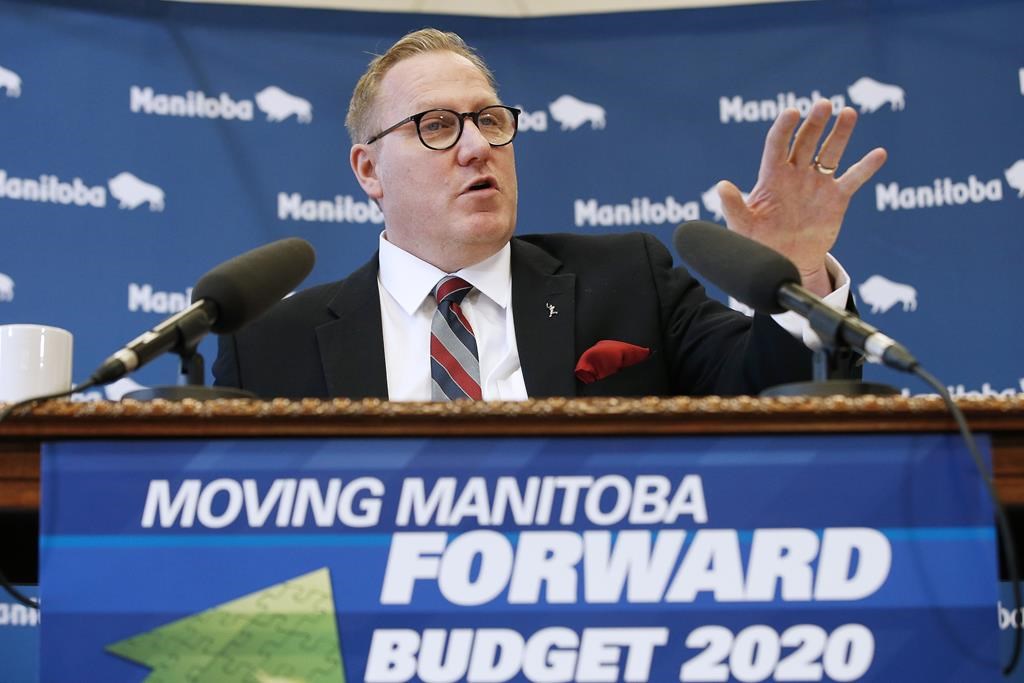The Manitoba government said Monday it has identified non-essential public-sector jobs that can be temporarily cut to free up money for the fight against COVID-19.

It did not provide details on how many jobs that would involve, which workers would be affected, or how many employees might get to share jobs instead of being laid off until the pandemic ends.
“We hope to continue to work with the unions to avoid layoffs. (Public-sector) employers have other options to explore, such as voluntary reduced work weeks and work-sharing options,” Finance Minister Scott Fielding said.
The Progressive Conservative government is expecting the COVID crisis to be a $5-billion hit to the budget — a combination of increased health-care costs and reduced tax revenues from a slumping economy.
Last month, the government asked public-sector workers to consider accepting reduced work weeks and job-sharing to help control spending, or face layoffs.
Shortly after that, the government ordered universities, Crown corporations and other public agencies to map out three scenarios for cutting their labour costs between now and September — by 10, 20 and 30 per cent.
Fielding said the government ended up with an average reduction that will save 2.2 per cent in labour costs. But that is over the full fiscal year — not just the four-month temporary reduction period.
The percentage also varies greatly between each public body, he added.
The province’s Crown corporations, for example, are to see cuts that amount to an 11.2 per cent saving over the full year, Fielding said. Much of that is linked to Manitoba Liquor and Lotteries, which operates two casinos that have been shut down by the pandemic.
School divisions and universities are to see labour-cost cuts of about 1.3 per cent.
Fielding said the temporary job cuts, along with a reduction in non-essential travel and other government spending, will free up $860 million this year to held fight COVID-19.
The Manitoba Government and General Employees’ Union said it has been left in the dark as to how many jobs are going to be axed.
- As Loblaw boycott begins, what to know about all the company’s brands
- $34B Trans Mountain pipeline expansion project opens after years of construction
- Toxic metals in vapes may pose major health risks for youth, study finds
- Nearly 60% of retirees are supporting adult children financially, survey finds
“They’ve still not talked to us at all,” union president Michelle Gawronsky said.
“We’ve had three weeks of people waking up every morning, wondering if they’ve got a job at the end of the day.”
Also on Monday, the government reported that there were no new COVID-19 cases in keeping with a long trend of zero or single-digit increases.
Total cases remain at 281. Six people have died and 238 have recovered, leaving 37 active cases in the province.

Questions about COVID-19? Here are some things you need to know:
Health officials caution against all international travel. Returning travellers are legally obligated to self-isolate for 14 days, beginning March 26, in case they develop symptoms and to prevent spreading the virus to others. Some provinces and territories have also implemented additional recommendations or enforcement measures to ensure those returning to the area self-isolate.
Symptoms can include fever, cough and difficulty breathing — very similar to a cold or flu. Some people can develop a more severe illness. People most at risk of this include older adults and people with severe chronic medical conditions like heart, lung or kidney disease. If you develop symptoms, contact public health authorities.
To prevent the virus from spreading, experts recommend frequent handwashing and coughing into your sleeve. They also recommend minimizing contact with others, staying home as much as possible and maintaining a distance of two metres from other people if you go out.
For full COVID-19 coverage from Global News, click here.





Comments